TO BUILD A CASTLE My Life As a Dissenter
Izvorna cijena bila je: €8,00.€6,00Trenutna cijena je: €6,00.
Na zalihi
| Težina | 1158 g |
|---|---|
| Format | 16 × 24 cm |
| Autor | |
| Izdavač | |
| Godina | 1979 |
| Broj stranica | 438 |
| Uvez | Tvrdi |
| Stanje knjige | Vrlo dobro |
By Raymond Nadeau This is truly an exceptional achievement, unlike anything to have come out of the Soviet Union before or since Stalin. It is much, much more than just another “voice from the chorus.” At 36, Vladimir Bukovsky has spent one third of his life in Soviet prisons, labor camps, and psychiatric hospitals. From the moment of his first arrest, while still a high school student, to his sudden expulsion in 1976, Bukovsky’s determination was to survive, and to learn the intricate workings of the Soviet legal system in order to fight back. Fight back he did, and more often than not he paid dearly for his tenacity. Certainly, we have read of these horrors more often than we like to remember, yet Bukovsky’s case stands out sharply in contrast to other men like Solzhenitsyn and Sakharov. Bukovsky was of a generation that held little hope for socialism and certainly none for Leninist-Stalinist socialism. He and his friends fought the authorities with a youthful determination which found little room for sentiment. Indeed, at no time in Soviet history had men so courageously defied the authorities in the face of almost certain imprisonment or death. For the first time, the “politicals” were not condemned to the torment of other prisoners. Instead, they were looked to for guidance, support, courage. And they brought with them hope. Enduring torture, starvation, and the worst forms of humiliation, Bukovsky learned the details of the Soviet legal system. He created a bureaucratic nightmare of appeals and demands which he knew were all within the limit of the Soviet law. Knowing how badly informed Soviet jurists were about procedural law, he devoured the criminal codes like detective novels. He found legal means of defending his right to conscience that even some lawyers knew nothing about. He was, in fact, that unique Soviet prisoner, his own defense counsel. Of course, this proved to be an embarrassment to the government, which forced them to invent new laws countermanding those already in existence. Bukovsky also recorded in secret and with great detail, psychiatric case histories, and the diagnoses of doctors convinced that dissidence was a form of “creeping schizophrenia.” These he smuggled to the West, asking that they be presented to the World Psychiatric Association, meeting that year, 1971, in Mexico City. Because the entire Soviet bloc threatened to walk out, the assembly ignored the issue. Yet Bukovsky had made his point and did not lose his spirit. After 12 years of this suffering, the Soviet government responded in the way Bukovsky had at first envisioned. The system, unable to deal with the accurate charges being made against it, began to fumble and to frighten even itself. Bukovsky would not give up. The government’s reaction was lacerating and ultimately inept. They had no choice. World-wide pleas for Bukovsky’s release made extermination impossible. Their only choice was to throw him out. So quite suddenly, Bukovsky was exchanged for Chilean communist leader Luis Covalan, which in effect exposed, if only implicitly, an admission of guilt on the part of the Soviets, that they were in fact guilty of political repression. That the exchange was made between the Pinochet regime and the Soviet Union, was, in Bukovsky’s words, “a symbol of the times.” No review can do justice to this book or to Bukovsky. The justice comes in its being read, for Bukovsky is a marvelous writer. His attention to detail may be horrific, but it will move you as it should. His description of his final flight from his homeland is one of the most moving passages in memory. And Bukovsky is not without humor and tenderness. Yet most important is the determination that emanates from the book.
